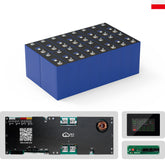Elegir entre baterías de 4 Ah y 6 Ah es sencillo
Al elegir la batería adecuada para su herramienta eléctrica, un dilema frecuente es elegir entre baterías de 4 Ah y de 6 Ah . Estas dos opciones pueden parecer similares, pero su rendimiento, autonomía, peso y precio pueden marcar una gran diferencia según sus necesidades. Tanto si es aficionado al bricolaje como si es contratista profesional, es fundamental comprender las diferencias y cómo afectan a su trabajo. Esta guía le explica todo lo que necesita saber para tomar una decisión segura e informada.
- Comprensión de los conceptos básicos de las baterías de 4 Ah y 6 Ah
- Comparación de la autonomía y el rendimiento de baterías de 4 Ah y 6 Ah
- Consideraciones de peso y portabilidad para baterías de 4 Ah y 6 Ah
- Diferencias de tiempo de carga entre baterías de 4 Ah y 6 Ah
- Consideraciones de costo al elegir entre baterías de 4 Ah y 6 Ah
- Expectativa de vida útil de las baterías de 4 Ah y 6 Ah
- Aplicaciones ideales para baterías de 4 Ah y 6 Ah
- Pros y contras de las baterías de 4 Ah y 6 Ah
- Compatibilidad entre herramientas y baterías de 4 Ah y 6 Ah
- Uso profesional vs. uso por cuenta propia de baterías de 4 Ah y 6 Ah
- Consejos de viaje y almacenamiento para baterías de 4 Ah y 6 Ah
- Preguntas frecuentes sobre baterías de 4 Ah y 6 Ah
- Recomendaciones de expertos para elegir entre baterías de 4 Ah y 6 Ah
- Cómo elegir el tamaño de batería adecuado
Comprensión de los conceptos básicos de las baterías de 4 Ah y 6 Ah
¿Qué significa Ah en las baterías?
Ah, o amperio-hora, es una unidad que mide la capacidad de la batería. En términos más simples, indica cuánta energía puede almacenar una batería. Una batería de 4 Ah puede suministrar 4 amperios de corriente durante una hora, mientras que una batería de 6 Ah puede suministrar 6 amperios durante una hora, o 3 amperios durante dos horas, y así sucesivamente. Esto significa que la batería de 6 Ah suele ofrecer una mayor autonomía.
Voltaje de la batería vs. capacidad de la batería
Mientras que Ah mide la capacidad, el voltaje determina la potencia de salida. La mayoría de las herramientas eléctricas mantienen el voltaje constante, por lo que la decisión entre una batería de 4 Ah y una de 6 Ah influye principalmente en la duración de las herramientas con una sola carga, no en su potencia durante el uso.
Comparación de la autonomía y el rendimiento de baterías de 4 Ah y 6 Ah
¿Cuál dura más?
Como era de esperar, la batería de 6 Ah dura más que la de 4 Ah . Si trabaja en tareas intensivas, como perforar mampostería o usar una sierra circular en madera dura, una batería de 6 Ah puede ofrecer ventajas significativas al minimizar el número de cambios de batería.
¿Existe una diferencia de potencia?
No. Suponiendo que ambas baterías tengan el mismo voltaje, la potencia de salida será idéntica. Una batería de 4 Ah y otra de 6 Ah suministran la misma cantidad de energía a la herramienta, pero la de 6 Ah la mantiene durante más tiempo.
>>Vea también Cuánto puede durar una batería de bicicleta eléctrica de 48 V y 20 Ah
Consideraciones de peso y portabilidad para baterías de 4 Ah y 6 Ah
Más pesado no siempre es mejor
La principal desventaja de una batería de 6 Ah es el peso. Una mayor capacidad requiere más celdas, lo que aumenta el peso. Si utiliza una herramienta durante períodos prolongados por encima de la cabeza o en posiciones incómodas, el peso adicional podría causar fatiga. La principal diferencia entre una batería de 4 Ah y una de 6 Ah es aquí donde cada gramo cuenta.
Usos ideales según el peso
Batería de 4 Ah : mejor para trabajos manuales o de precisión como destornilladores de impacto o lijadoras de detalles.
Batería de 6 Ah : mejor para herramientas de alto consumo, como sierras ingletadoras, martillos rotativos o sopladores de hojas, donde un tiempo de funcionamiento prolongado vale el peso adicional.
Diferencias de tiempo de carga entre baterías de 4 Ah y 6 Ah
¿Cuánto tiempo tarda cada uno en recargarse?
En promedio, una batería de 4 Ah tarda entre 60 y 90 minutos en recargarse, mientras que una de 6 Ah puede tardar entre 90 y 120 minutos, dependiendo del cargador. Los cargadores rápidos pueden reducir significativamente este tiempo, pero el tiempo de carga sigue siendo un factor importante si solo tienes una batería y una jornada completa de trabajo por delante.
Compatibilidad del cargador
La mayoría de los cargadores modernos admiten baterías de 4 y 6 Ah , pero siempre es recomendable consultar las especificaciones del suyo. Usar el cargador adecuado no solo garantiza una carga más rápida, sino que también prolonga la vida útil de la batería.
Consideraciones de costo al elegir entre baterías de 4 Ah y 6 Ah
Diferencia de precios e impacto en el presupuesto
La batería de 6 Ah es más cara, a veces entre un 20 % y un 50 % más cara que la de 4 Ah . Si tienes un presupuesto ajustado y puedes trabajar con una autonomía más corta, la de 4 Ah podría ser la mejor opción.
Valor a largo plazo
Si bien una batería de 6 Ah tiene un costo inicial más alto, podría ahorrarle dinero a largo plazo gracias a menos cargas y reemplazos menos frecuentes. Las baterías de 4 Ah y 6 Ah suelen tener una vida útil similar, pero la de 6 Ah podría requerir menos ciclos para ofrecer la misma cantidad de trabajo.
Expectativa de vida útil de las baterías de 4 Ah y 6 Ah
¿Cuánto durará cada uno?
Las baterías de iones de litio de 4 Ah y 6 Ah pueden durar entre 3 y 5 años o entre 300 y 1000 ciclos de carga con el cuidado adecuado. La versión de 6 Ah puede durar un poco más en la práctica, ya que no necesita cargarse con tanta frecuencia.
Factores que afectan la longevidad de la batería
Temperatura de almacenamiento
Ciclos de carga
Profundidad de descarga
Demanda de herramientas (uso de alto consumo vs. uso de bajo consumo)
Aplicaciones ideales para baterías de 4 Ah y 6 Ah
Usos ideales de la batería de 4 Ah
Taladros y atornilladores compactos
Tareas en interiores o de corta duración
Trabajos por encima de la cabeza o con escalera
Corte o rectificado de trabajo ligero
Usos ideales de la batería de 6 Ah
Trabajos al aire libre o de larga duración
Sierras circulares y sierras alternativas
Equipos para césped como cortadoras y sopladoras
Tareas de construcción donde no hay energía enchufable disponible
Pros y contras de las baterías de 4 Ah y 6 Ah
Ventajas de las baterías de 4 Ah
Más ligero y fácil de manejar.
Más barato comprar
Más rápido para recargar
Desventajas de las baterías de 4 Ah
Tiempo de ejecución más corto
Cambios de batería más frecuentes
Menos ideal para aplicaciones de trabajo pesado
Ventajas de las baterías de 6 Ah
Mayor tiempo de ejecución
Menos interrupciones para recargar
Mejor para herramientas que consumen mucha energía
Desventajas de las baterías de 6 Ah
Más pesado y voluminoso
Más caro
Mayor tiempo de recarga
Compatibilidad entre herramientas y baterías de 4 Ah y 6 Ah
¿Son todas las herramientas compatibles?
En la mayoría de los casos, sí. Si su herramienta acepta baterías de 18 V o 20 V máx., probablemente acepte las variantes de 4 Ah y 6 Ah , siempre que sean de la misma marca y línea de baterías.
Notas específicas del fabricante
Marcas como DeWalt, Milwaukee, Makita y Ryobi ofrecen compatibilidad dentro de sus plataformas de baterías, pero rara vez se permite mezclar marcas. Siempre revise las especificaciones antes de comprar.
Uso profesional vs. uso por cuenta propia de baterías de 4 Ah y 6 Ah
Usuarios de bricolaje
Uso ocasional
Herramientas ligeras y reparaciones básicas
Presupuesto más pequeño
Prefiero 4 Ah por asequibilidad y peso.
Profesionales
Uso diario y prolongado
Mayores exigencias de herramientas
El tiempo es dinero: prefiera 6 Ah por eficiencia
Una mayor cantidad de baterías significa menos tiempo de inactividad
Consejos de viaje y almacenamiento para baterías de 4 Ah y 6 Ah
Almacenamiento seguro
Conservar entre 40 °F y 80 °F (4 °C y 27 °C)
Evite la humedad y la luz solar directa.
Almacenar con una carga del 40 al 60 % si no se utiliza durante períodos prolongados
Pautas de viaje
Si viaja con baterías de herramientas eléctricas, tanto las baterías de 4 Ah como las de 6 Ah están por debajo del umbral de 100 Wh, lo que las hace compatibles con la TSA para equipaje de mano (no facturado).
Preguntas frecuentes sobre baterías de 4 Ah y 6 Ah
¿Puedo mezclar y combinar baterías de 4 Ah y 6 Ah?
Sí, si sus herramientas y cargadores son compatibles. Muchos usuarios llevan ambos para equilibrar la autonomía y el peso según la tarea.
¿Una batería de 6 Ah dañará mi herramienta?
No, siempre que el voltaje coincida, una batería de 6 Ah no dañará su herramienta. Simplemente le permitirá funcionar durante más tiempo.
¿Existen baterías aún más grandes?
Sí, hay baterías de 9 Ah, 12 Ah e incluso 15 Ah para aplicaciones ultra exigentes, pero son más pesadas y costosas, a menudo excesivas para las necesidades típicas del bricolaje.
>>Vea también Cómo maximizar la eficiencia de los paneles solares para baterías de carritos de golf de 48 V
Recomendaciones de expertos para elegir entre baterías de 4 Ah y 6 Ah
Consejos para la toma de decisiones finales
Elija 4Ah si:
Valoras las herramientas ligeras
Tienes un presupuesto limitado
Realizas trabajos ligeros o medianos
Elija 6Ah si:
Trabajas muchas horas o utilizas herramientas que consumen mucha energía.
Quiere menos cambios de batería
No te importa el peso extra
En última instancia, la mejor opción entre baterías de 4 Ah y 6 Ah depende del caso de uso, la frecuencia de uso y si el tiempo de ejecución o el peso son más importantes para usted.
Cómo elegir el tamaño de batería adecuado
Elegir entre baterías de 4 Ah y 6 Ah no tiene por qué ser difícil. Al considerar sus herramientas, carga de trabajo, necesidades de autonomía y preferencias de manejo físico, podrá tomar la decisión correcta fácilmente. Ya sea que opte por la comodidad compacta de una batería de 4 Ah o por la potencia extendida de una de 6 Ah, saber cuál se adapta a su situación mejorará tanto la eficiencia como la satisfacción. En caso de duda, comience con una y pruébela en el campo: la batería adecuada demostrará su eficacia.
























Leave a comment
All blog comments are checked prior to publishing